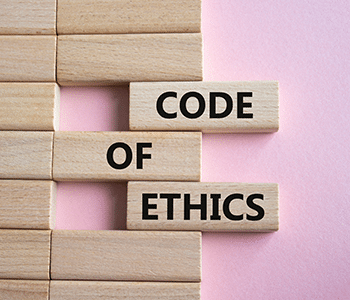January 17, 2024 5 min read

Ethics for Engineers: Staying Compliant & Why It Matters
Industry:
Solution:

All engineers are expected to follow a code of ethics and hold themselves to high standards of integrity in their work. Ethics for engineers is one of many important topics that engineers must include in their annual continuing education. Providing high-quality ethics training for your workforce helps keep your engineers compliant with ethical standards to provide best-in-class services on every project.
What Are Engineering Ethics? And Why Do They Matter?
Engineering ethics are the standards that all engineers are held accountable to. Following strict rules and guidelines helps ensure that all engineering projects are safe and quality.
Because the work of engineers is paramount to the safety of our infrastructure and, therefore, communities, every state engineering board requires professional engineers (PE) to follow a code of ethics. In addition, all national engineering societies have their own ethical standards that must be followed by members.
The Code of Ethics in Engineering
The National Society of Professional Engineers (NSPE) has a code of ethics that is a great example of the type of standards engineers are held to. Their code says all engineers shall:
- Hold paramount the safety, health, and welfare of the public
- Perform services only in areas of their competence
- Issue public statements only in an objective and truthful manner
- Act for each employer or client as faithful agents or trustees
- Avoid deceptive acts
- Conduct themselves honorably, responsibly, ethically, and lawfully so as to enhance the honor, reputation, and usefulness of the profession
NSPE also then outlines in their code various other professional obligations to go into more detail on the items above. As you can see, ethics for engineers are taken very seriously.
So, why are ethical dilemmas so prevalent in engineering?
Prevalence of Ethical Dilemmas in Engineering
A worrying 46% of engineers said they encountered ethical dilemmas at work and 32% said they were aware of ethical violations in the workplace (NSPE).
NSPE has found in their research that the most common ethical lapses for engineers are:
- Conflicts of Interest
- Safety
- Lack of Accountability
When these ethical violations happen, it not only can hurt the reputation of the engineer, but of the AEC firm they work for. This can, naturally, lead to litigation and risk to public safety.
CE Requirements for Engineers: Ethics Training for Professional Engineers
The continuing education requirements for engineers can vary state to state and based on the professional certifications they maintain and societies they belong to. But numerous states that require continuing education units (CEUs) include ethics training in the annual (or biannual) license requirements.
Florida, for example, requires engineers to complete 18 hours of training every two years to maintain their licenses. Of those hours: one hour must relate to professional ethics.
By comparison, Delaware requires 24 CE hours every two years with three of those hours relating to ethics.
As an employer, it’s important for you to understand state CE requirements and adhere to them. And ensuring that your engineers don’t just check the box but receive high-quality ethics training is imperative to business success and operating with integrity.
Tips for Building an Ethical Culture in AEC Firms
Creating a robust ethical culture is paramount for AEC firms to uphold industry standards and promote integrity. Here are some practical tips to cultivate an ethical environment within your organization:
Leadership Commitment
Any cultural change or initiative must come from the top. Executives and leaders should lead by example by demonstrating ethical behavior.
It’s also important to show your employees that this isn’t just a box to check but a commitment your organization is making. You can do this by integrating ethical principles into your core values and mission and by promoting and recognizing employees based on living those standards.
Employee Training and Awareness
While ethics training is a requirement in most states for renewing licenses, that doesn’t mean you should stop at the bare minimum. And if you live in a state that doesn’t require this, you should still make it a priority.
A great way to drive home the importance of ethics training and following ethical standards is to share real-world scenarios of how these situations may play out. Make it part of your onboarding training by running through what employees should do if they are faced with an ethical dilemma or witness unethical practices.
Empowering AEC Teams through Online Training
Accredited online training and continuing education courses for the AEC industry
View Courses
Because this is such an important topic for AEC firms, we regularly update our ethics courses to stay up to date with the latest requirements and needs of the engineering workforce.
Most recently, we have updated the following courses to not only reflect regulations and safety updates, but also to ensure the content is engaging to ensure higher learner retention:
If you want to learn more about our engineering courses and training, please request a demo today.













